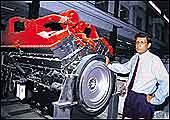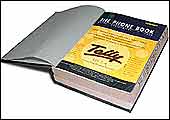 |
| R. Sreedher
(left) at the Univ: Radiostar |
If you'd like to
visit what is being touted as the tiniest radio station in the world,
you'll have to head for Chennai-borough Guindy where Anna University
is located. On February 1, the University launched the first community
radio station in the country, Anna FM 90.4. To most people who know
Dr R. Sreedher, the Director of the University's Audio Visual Research
Centre that doesn't come as a surprise. The man was part of the
community radio revolution in India, launching Gyan Vani for All
India Radio, Allahabad. Much later, in 1992, when he was serving
out a stint with the Department of Science and Technology, he produced
143 episodes of a science programme for school children that was
aired, every Sunday by 104 radio stations in 18 languages. Anna
University hired him in April last when it wanted to launch a radio
station. Sure enough, that's what he has done. Students of the university's
electronics media course are thrilled. Some of them are carrying
out audience research surveys in the 15 kilometre radius the station
covers (that's some 70 per cent of Chennai). Others are looking
forward to opportunities in programming (largely tech-speak for
students, campus round-ups, and programmes targeting neighbouring
communities such as fisherfolk), editing, even equipment maintenance.
Anna FM 90.4 is run on a shoe-string budget, but it promises to
be different from the staple 'hottest hits' FM channels crowding
India's airwaves.
-Nitya Varadarajan
NEWSMAKER
Ravi Venkatesan,
41
 |
| Microsoft's
Ravi Venkatesan: The wheels of the new-e |
When Microsoft
first approached Ravi Venkatesan, then the chairman of Cummins India
about being its chairman in India, the man didn't know what to make
of it. ''My first reaction was that of disbelief; I mean what do
I know about software,'' he recollects. Six months later, Venkatesan,
who at one point in time looked set to become a Cummins lifer-he
was a star in the system and, for the record, started his association
with the company when he interned at the Indian operations while
still a student at IIT, Bombay-has filled a designation created
specifically for him by Microsoft. ''I think it was the meeting
with Bill Gates and Microsoft's top managers that clinched it for
me,'' he says. Venkatesan has no experience in the software industry,
but has been a constant in most headhunters' radar, especially while
seeking to fill top-level vacancies, although he himself had never
seemed interested. Still, it has a lure all its own and as Venkatesan
puts it, ''This is (probably) the last chance I'll get to be part
of one of the greatest revolutions of our time.''
-Abir Pal
From
The Oxford Dictionary
In India
Used to describe anything and everything
about the economy and the country as of now. Has become a favourite
word of correspondents and editors. These lines can be found in
any publication.
The economy is in feelgood mode.
The markets have factored in the feelgood sentiment.
The BJP is hoping that the current
feelgood factor will help it in the upcoming election.
Only in India can an obscure word (wrongly used,
without the hyphen at that) steal the limelight. We just hope that
the word doesn't go down in history for the wrong reasons.
OBITUARY
Is The Telephone Directory Dead?
 The
last year that Mumbai's Mahanagar Telephone Nigam Limited (MTNL)
brought out a complete telephone directory was 1999. And as G.V.R.S.
Kumar, General Manager (Marketing), MTNL, puts it, "I wouldn't
know if work is on to bring one out in 2004." One reason for
the demise is declining demand. The second is the booming mobile
telephony market: none of the mobile telcos publishes. The last
is the cost involved. The telephone departments in various cities
used to work around this by allying with yellow pages publishers
to offer directories with yellow pages. GETIT Infomediary still
does so in 10 cities including Chennai and Bangalore, but in most
other places, the publishers have realised, as Mankerand Lele, General
Manager, Yellow Pages, Tata Infomedia explains, that "the earlier
model of yellow pages compensating for the cost of the printing
the telephone directory doesn't work." Reason: poor distribution
by the telephone departments concerned. Now, most yellow pages come
as standalones (Tata Infomedia distributes half-a-million every
year). The
last year that Mumbai's Mahanagar Telephone Nigam Limited (MTNL)
brought out a complete telephone directory was 1999. And as G.V.R.S.
Kumar, General Manager (Marketing), MTNL, puts it, "I wouldn't
know if work is on to bring one out in 2004." One reason for
the demise is declining demand. The second is the booming mobile
telephony market: none of the mobile telcos publishes. The last
is the cost involved. The telephone departments in various cities
used to work around this by allying with yellow pages publishers
to offer directories with yellow pages. GETIT Infomediary still
does so in 10 cities including Chennai and Bangalore, but in most
other places, the publishers have realised, as Mankerand Lele, General
Manager, Yellow Pages, Tata Infomedia explains, that "the earlier
model of yellow pages compensating for the cost of the printing
the telephone directory doesn't work." Reason: poor distribution
by the telephone departments concerned. Now, most yellow pages come
as standalones (Tata Infomedia distributes half-a-million every
year).
As for the directory...
-Dipayan Baishya
Retail
Goliath
Mumbai, here we come.
 |
| Hyderabad Giant:
Size, it would appear, matters |
With
its first (and thus far, only) giant hypermart (or hyper market
as everyone insists it be called) nudging revenues of Rs 100 crore,
the RPG Group, realising that it is on to a good thing, is investing
in 15 more Giants over the next two years; the first of these, will
open for business in Mumbai, a city the company has traditionally
stayed away from citing the prohibitively high cost of real estate
space, on February 21. As someone who has shopped at Giant, this
correspondent can safely say that the store's USP (unique selling
proposition) is its shopping area-trading area, as the Head of Hyderabad's
Giant V. Jagannathan calls it. The hypermart, which opened for business
on June 27, 2001, covers 45,000 square feet of space and sells 25,000
SKUs (stock keeping units) from vegetables to personal-care products
to electronic goods. Hyderabad may have worked, but the company
is likely to find operating a hypermart in Mumbai a different ballgame
altogether.
-E. Kumar Sharma
|
